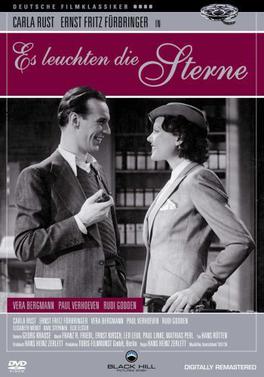The Stars Shine
1938 film From Wikipedia, the free encyclopedia
The Stars Shine (German: Es leuchten die Sterne) is a 1938 German musical revue directed by Hans H. Zerlett and written by Zerlett and Hans Hannes.[1][2][3]
| The Stars Shine | |
|---|---|
 DVD cover | |
| Es leuchten die Sterne | |
| Directed by | Hans H. Zerlett |
| Written by |
|
| Produced by | Helmut Schreiber |
| Starring | |
| Cinematography | Georg Krause |
| Edited by | Ella Ensink |
| Music by |
|
Production company | |
| Distributed by |
|
Release date |
|
| Country | Nazi Germany |
| Language | German |
Synopsis
A young secretary leaves the country and travels to Berlin to seek work as an actress. In a comedy of errors, she is mistaken for a famous dancer, which results in her heading the cast of a star-studded musical. The plot acts as a backdrop for this musical revue film, which includes many German film, sports, and entertainment stars of the 1930s.
Background
Summarize
Perspective
Es leuchten die Sterne was a remake of the 1930 Tobis film Die Große Sehnsucht (The Great Yearning), directed by Stefan Szekely, a Hungarian Jew.[4] The remake was created as a Busby Berkeley-style musical set inside a movie studio,[5] and featured appearances by numerous stage personalities, athletes, and Tobis Films stars.[6] Joseph Goebbels was Propaganda Minister and considered entertainment films to be the best type of media with which to convey the political message of the Nazi regime.[7][8] Es leuchten die Sterne was created, as were many German films of the period,[9] to act as a propaganda piece promoting the Third Reich as a cultural entity.[8][10][11]
Release
The film was first released in Germany on 17 March 1938. This was followed by a release in the Netherlands on 29 April, and then in the United States on 20 May as The Stars Shine.[12] It was released in various countries under different titles: in Belgium as Als de sterren schitteren (Flemish) and as Quand les étoiles brillent (French); in Italy as Brillano le stelle; in Denmark as Funklende stjerner; in Greece as Lampoun t' asteria; in France as Les étoiles brillent and as Vedettes follies; and in the Netherlands as Parade der sterren and Sterrenparade.[10] The film was released on DVD in its original German version on 21 July 2008 by Warner Home Video.[2]
Excerpts from the film were shown on German television in 1938, with La Jana present in the studio.[13]
Cast
- La Jana as The Dancer
- Ernst Fritz Fürbringer as Hans Holger
- Fridtjof Mjøen as Werner Baumann
- Paul Verhoeven as Gebauer
- Karel Stepanek as Brandt
- Paal Roschberg as the Dancer (billed as Paul Roschberg)
- Arthur Schröder as the Director
- Rosita Serrano as the Spanish singer
- Hermann Pfeiffer as the Production manager
- Rudolf Schündler as the Insurance man
- Vera Bergman as Carla Walden
- Carla Rust as Mathilde Birk
- Rudi Godden as Knutz the manager
- Elisabeth Wendt as Lisa Marwen
- Else Elster as Mrs. Knutz
- Eva Tinschmann as Mrs. Bökelmann
- Horst Birr as Kruse
- Erwin Biegel as Kellner
- Erika Steenbock as Ella the actress
- Heinz Piper as the Lyricist
- Kurt Mikulski as Böckelmann the makeup artist
- Featured appearances
- Rudolf Caracciola
- Olga Chekhova
- Lil Dagover
- Karl Ludwig Diehl
- Käthe Dorsch
- Willi Forst
- Charles Francois
- Gustav Fröhlich
- Heinrich George
- Walter Gross
- Paul Hartmann
- Hilde Hildebrand
- Paul Hörbiger
- Jenny Jugo
- Paul Kemp
- Hermann Lang
- Wolfgang Liebeneiner
- Harry Liedtke
- Paul Lincke
- Theo Lingen
- Hans Moser
- Anny Ondra
- Harald Paulsen
- Ralph Arthur Roberts
- Max Schmeling
- Sybille Schmitz
- Albrecht Schoenhals
- Hans Söhnker
- Luis Trenker
- Manfred von Brauchitsch
- Grethe Weiser
- Ida Wüst
References
External links
Wikiwand - on
Seamless Wikipedia browsing. On steroids.
